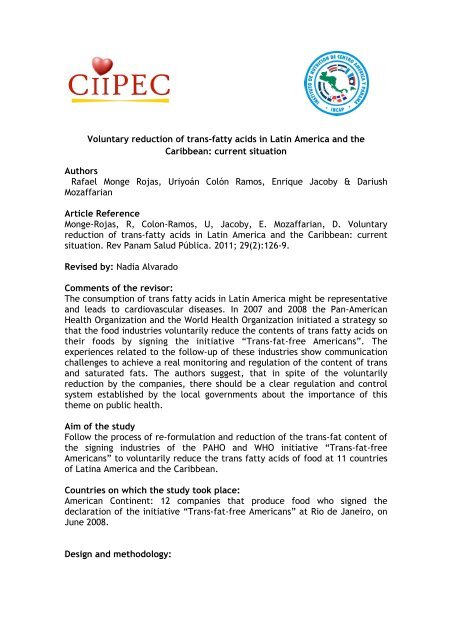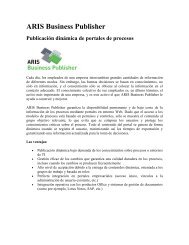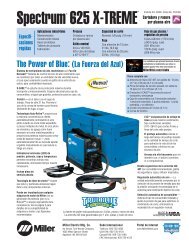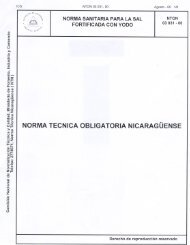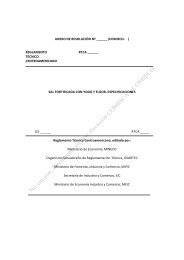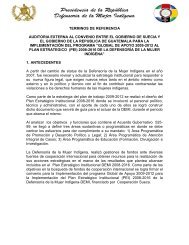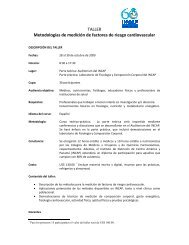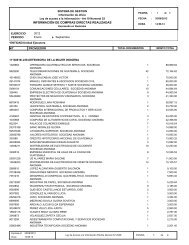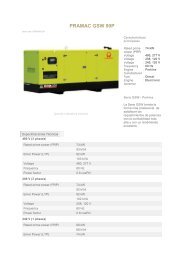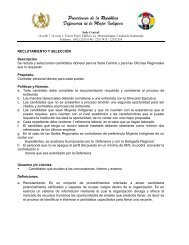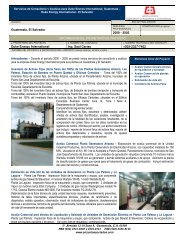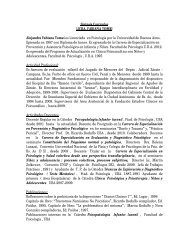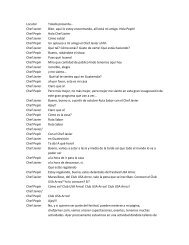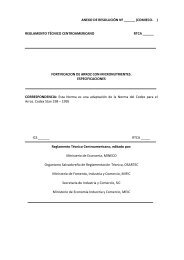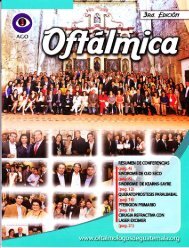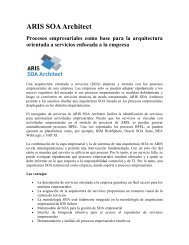Trans-Fat Reduction - central america
Trans-Fat Reduction - central america
Trans-Fat Reduction - central america
You also want an ePaper? Increase the reach of your titles
YUMPU automatically turns print PDFs into web optimized ePapers that Google loves.
Voluntary reduction of trans-fatty acids in Latin America and the<br />
Caribbean: current situation<br />
Authors<br />
Rafael Monge Rojas, Uriyoán Colón Ramos, Enrique Jacoby & Dariush<br />
Mozaffarian<br />
Article Reference<br />
Monge-Rojas, R, Colon-Ramos, U, Jacoby, E. Mozaffarian, D. Voluntary<br />
reduction of trans-fatty acids in Latin America and the Caribbean: current<br />
situation. Rev Panam Salud Pública. 2011; 29(2):126-9.<br />
Revised by: Nadia Alvarado<br />
Comments of the revisor:<br />
The consumption of trans fatty acids in Latin America might be representative<br />
and leads to cardiovascular diseases. In 2007 and 2008 the Pan-American<br />
Health Organization and the World Health Organization initiated a strategy so<br />
that the food industries voluntarily reduce the contents of trans fatty acids on<br />
their foods by signing the initiative “<strong>Trans</strong>-fat-free Americans”. The<br />
experiences related to the follow-up of these industries show communication<br />
challenges to achieve a real monitoring and regulation of the content of trans<br />
and saturated fats. The authors suggest, that in spite of the voluntarily<br />
reduction by the companies, there should be a clear regulation and control<br />
system established by the local governments about the importance of this<br />
theme on public health.<br />
Aim of the study<br />
Follow the process of re-formulation and reduction of the trans-fat content of<br />
the signing industries of the PAHO and WHO initiative “<strong>Trans</strong>-fat-free<br />
Americans” to voluntarily reduce the trans fatty acids of food at 11 countries<br />
of Latina America and the Caribbean.<br />
Countries on which the study took place:<br />
American Continent: 12 companies that produce food who signed the<br />
declaration of the initiative “<strong>Trans</strong>-fat-free Americans” at Rio de Janeiro, on<br />
June 2008.<br />
Design and methodology:
From June to October 2009, the researchers designed a standarized<br />
questionnaire which was sent to 12 companies who have adhere to the PAHO<br />
and WHO`s initiative, the main issues were:<br />
• Percentage and type of fats and oils used to replace the trans fats.<br />
• Actual and past content of specific foods.<br />
• Barriers found during the process of trans-fat elimination process.<br />
At the same time, two of the researchers made independent searches on the<br />
web pages of the companies about the declaration on the trans-fat content of<br />
food they make.<br />
Results<br />
The companies answer the questionnaire:<br />
Only 3 out of 12 companies answered the questionnaire completely, 3 of them<br />
returned an abstract but without giving information about specific products, 1<br />
company did not participated since it did not produced “fried or baked”<br />
foods. 5 companies did not answer the questionnaire.<br />
Percentage of trans-fat reduction<br />
They compared the content of fat on fast food, sauces and dressings, sweets<br />
and chocolates, sweet and salad cookies; the initial content which varied<br />
form 28g of trans fat/100 grams of total fat to 0 grams, there was a reduction<br />
between 0 to 100% depending on the product. The average reduction varied<br />
from 1.1 to 5.9 grams per portion to 0.2-0.6 g per portion.<br />
Type of fat and oils used to replace the trans fats<br />
The fats used to replace the trans fats are oil mixtures, which depend on the<br />
regional availability and the specific mixture of each company: McDonald`s<br />
uses in Brazil a mixture of cotton, palm and soybean oils; in South America<br />
they use soyflower with high contents of oleic acid and in Central America and<br />
the Caribbean they use sunflower, canola, soybean and corn oil.<br />
Cargill uses oils with high content of oleic acid in Mexico and Canada and an<br />
oil with high content of linoleic acid in Venezuela.<br />
Besides, PepsiCo, Nestlè and ABIA report the use of fat mixtures of cacao and<br />
palm, corn oil and sunflower with high content of oleic acid. PepsiCo uses<br />
corn oil to replace trans fats in 56% of its products, sunflower oil with medium<br />
content of oleic acid on 25% of their products and a mixture of corn and<br />
soyflower oils low on linoleic acid for 19% of their products. Finally, they use<br />
palm oil to replace 100% of trans fat in sweet and salty cookies.<br />
It is important to point out that the reports of the 2 companies mentioned<br />
that their products are free of trans fat since 2007-2008, but they don`t<br />
specify the specific actions in Latin America and the Caribbean.<br />
Obstacles found during the process of elimination of trans fat<br />
The companies report that the experimented barriers on this process are:<br />
• The identification and availability of a fat succedaneous of fat or oil<br />
that is adequate for their food products.<br />
• Cost of these substitutes
• Worries about the sensorial acceptance of the products modified by the<br />
consumers (for example; in cookies, the mouth sensation given by the<br />
“solid fats”).


